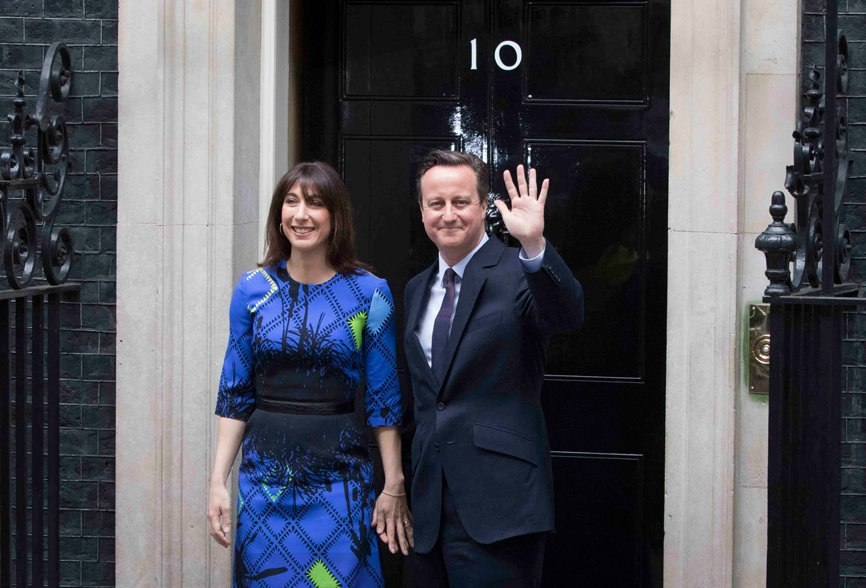Against all expectations (don’t pretend you foresaw it!) David Cameron has triumphantly won the general election.
He has led the Tories to government with a majority on its own for the first time since 1992. Not since 1983 has a prime minister in office increased support for his party at an election. The leaders of the parties he vanquished have resigned. In victory, Mr Cameron has said he wants to govern the country as one nation and as a United Kingdom. But one part of that kingdom voted overwhelmingly for a party that wants to break it up. So can the Prime Minister deliver on this pledge and on all the other issues that are now piled up in his in-tray?
Until early on Friday morning the unanimous consensus was that Britain would elect a hung parliament. Such was the expected deadlock that it even looked unlikely that a coalition government could be put together and the country would end up with an unstable minority government. The most optimistic Tories hoped that their party could scrape together 290 seats and so secure the chance to form that government.
But the Conservatives have exceeded their wildest dreams and ended up with 331 seats, almost a hundred more than Labour. It gives them a majority of twelve in the new parliament. The Labour Party fell back even further. Most dramatically it was hammered in Scotland, where it lost all but one of the 41 seats it held in the last Parliament. They all went to the Scottish National Party, which went from 6 to 56 of the 59 seats in Scotland. But Labour also failed to win the Tory seats in England it needed to have any chance of offsetting its predicted drubbing north of the border. As a result, it ended up with 26 fewer seats than in 2010. Prominent among the losers were not only all its Scottish leaders, but also the shadow chancellor, Ed Balls. Ed Miliband, the party leader, resigned.
Even more dramatic was the fate of the Tories’ coalition partners in the last parliament, the Liberal Democrats. They took all the hammering for any public hostility to the coalition government and collapsed from 57 seats to 8, with their share of the vote dropping from 23% to below 8%. Three of the party’s cabinet ministers were chucked out of their seats, including Vince Cable. The LibDem leader, Nick Clegg, resigned.
The United Kingdom Independence Party, which only last summer had grounds for claiming it was creating an earthquake in British politics, ended up with only one seat and its leader, Nigel Farage, failed to win his. He could complain (and did) that the electoral system was wildly unfair. His party won almost four million votes and was rewarded with only one seat, whereas the SNP got 1.5 million votes and 56 seats. But that’s how the system operates. He too resigned, though he left open the possibility of running for the leadership again.
So David Cameron swept all before him. No wonder there has been euphoria in the Tory Party. But there is another way of looking at it. Although the Conservatives have won the prize of being able to govern on their own, David Cameron’s new majority is far less than the one he enjoyed while he was in coalition with the LibDems. He has a smaller majority than his Tory predecessor, John Major, who unexpectedly won in 1992 and subsequently had a pretty torrid time as prime minister. So how is Mr Cameron going to manage, given the problems he faces?
The most striking of them will be the presence of so many SNP MPs in the new House of Commons. They will make up the third largest bloc in the chamber after Labour. Mr Cameron has pledged to deliver on the promise of much greater devolution of powers to Scotland (and also Wales and Northern Ireland) which was made after the independence referendum last year by all the major UK parties. But these are unlikely to satisfy an SNP whose ultimate aim is to take Scotland out of the UK.
Of course those SNP MPs will not have the decisive influence they were hoping for in a hung parliament, so Mr Cameron may take the view that they can take or leave the proposals he introduces without his having to worry too much about the consequences of their rejecting them. But in giving Scotland more powers he is also committed to giving English MPs more say over exclusively English matters, and getting agreement on how to do this may not be easy with a small majority. If he gets it wrong, he could end up provoking the English into supporting the SNP and granting their wish for an independent Scotland. That’s something to which he is emphatically opposed. He has promised to preserve the Union. But this too may prove difficult with so small a majority. If ‘one nation’ means governing from the centre, it becomes more difficult to achieve when the avowedly centrist LibDems are no longer a force in government pulling it in that direction. Mr Cameron’s more rightwing backbenchers may have other ideas and be in a position to pressure their leader into adopting them.
But perhaps his biggest problem with his new dependence on his own MPs alone will be over Europe. He is committed to renegotiating the terms of British membership of the European Union and putting the results to an in-out referendum before the end of 2017. He has made clear he hopes that successful negotiations will allow him to campaign in that referendum for Britain to stay in. But his party is deeply divided over it. Many of his backbenchers will certainly use their new influence to force him to take a tougher line in the negotiations, making it harder for him to reach agreement with his EU partners. But even if he strikes a deal, it’s likely his party will split in the ensuing referendum making governing with a small majority extremely hard. No wonder he has already said he doesn’t want to fight another general election.
The Prime Minister will undoubtedly be feeling huge personal pleasure in his unexpected electoral triumph but he will know just how difficult things may get. His predicament is just like John Major’s back in 1992.
In his memoirs, one of John Major’s closest advisers, the diplomat, Stephen Wall, wrote of the time immediately after the 1992 election: ‘When I congratulated him on having achieved his own mandate, he replied: “You wait. This is where my troubles really begin.” ’
Is this going to be David Cameron’s fate?
What’s your view of why the Tories unexpectedly won? And how well do you think David Cameron will be able to handle the problems that now face him?










